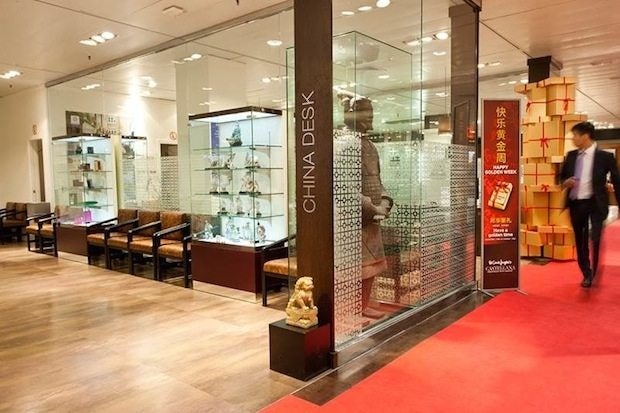
China’s Golden Week wrapped up yesterday, with Chinese consumers traveling the world for sightseeing, dining, wine tasting, fun, and of course, shopping. Coming just a few days after the Lunar Mid-Autumn Festival, this year’s holiday was considered a “Super Golden Week,” one that lets Chinese tourists combine the two holidays for a longer travel period.
Following weeks of concern over the Chinese economy, China watchers will definitely keep a close eye on Golden Week tourism spending and traffic to assess the ongoing effects of the market on the tourism sector.
While the exact numbers have yet to be tallied, early accounts indicate that Chinese tourists are venturing farther afield and changing their spending habits.
According to Alex Li of Caissa Travel, a Chinese tour operator with a growing footprint in the Europe market, “more Chinese travelers are taking advantage of the close proximity of Moon Festival and Golden Week this year by traveling longer distances than usual.” Added Li, “As a result, the company has seen significant demand for tours to Japan, Korea and United States.”
Li feels that the new biometric fingerprint requirements for Schengen visas “might have prevented the [Europe] market from gaining a bigger share this year.”
The EU’s new requirement to have Chinese applicants for Schengen visas provide biometric data requires first-time visa applicants to personally apply at consulates or external service providers to submit fingerprints and a digital photo.
Biometric concerns aside, leading Chinese online travel agency Ctrip noted strong interest in long-distance travel this year, with particularly solid bookings seen for Europe, Australia, and the United States.
In all, an estimated 4 million Chinese tourists are expected to have traveled abroad over the course of this Golden Week, an increase of 11 percent over last year. However, not every destination is benefiting equally from this growth.
Despite an estimated 16 percent increase in mainland Chinese tourist arrivals, Hong Kong retailers have lamented lackluster sales this Golden Week, continuing the trend of mainland tourists opting to skip Hong Kong and do their big-ticket shopping in countries such as South Korea, Japan, Thailand, and the United States.
Among Asian destinations, Thailand looks to be a clear beneficiary as Chinese tourists forego Hong Kong. Srisuda Wanapinyosak of the Tourism Authority of Thailand (TAT) said last week that the TAT expects 160,000 Chinese tourists to visit Thailand during Golden Week, a 40 percent increase year-over-year.
South Korea, too, expects its post-MERS tourist rebound to continue, with the Korea Trade Organization (KTO) estimating around 210,000 Chinese tourist arrivals during Golden Week, an increase of 30 percent over last year.
Retailers Roll Out the Golden Carpet#
Stats about Chinese travelers fanning the globe are all well and good, but what, on a practical level, are successful retailers doing to attract this big-spending demographic?
In South Korea, they went ahead and invented their own holiday. Looking to woo foreign tourists (as well as locals), leading Korean retailers launched a massive promotional sales event called “Korea Black Friday,” slashing prices to attract bargain-seekers. Global duty-free retailer DFS, too, ran Golden Week promotions at airport outlets worldwide to bring in Chinese globe-trotters wherever they happen to be.
Major department stores also rolled out the red carpet this Golden Week, with Macy’s, Bloomingdales, Bergdorf Goodman, Printemps, Galeries Lafayette, and Spain’s El Corte Inglés engaging Chinese tourist-shoppers.
Example: El Corte Inglés#
For its part, El Corte Inglés partnered with luxury watchmakers such as Longines, Jaeger-LeCoultre, Blancpain, Tag Heuer, Glashutte Original, Cartier, Omega, IWC, Bulgari, Longines, and Panerai. Just for El Corte Inglés shoppers, each brand featured a unique offer during Golden Week, ranging from VIP services to in-store presentations and special gifts with purchase.
El Corte Inglés itself took place in the promotion by offering exclusive gifts with purchase. Customers spending more than 20,000 euros received a bottle of Johnny Walker Gold Label through October 6—a promotion that several Chinese shoppers were quick to take advantage of.
El Corte Inglés also went digital this Golden Week, running a special WeChat promotion for WeChat users at its Castellana flagship store in Madrid. Guests who followed the El Corte Inglés WeChat account during the October holiday were entered into a competition to win special prizes for redemption in-store.
As the stats and stories pour in, China’s Golden Week holiday continues to serve as an important indicator of what to expect in the remainder of the year, and what we could see shaping up around the next major travel holiday—Chinese New Year.
Renee Hartmann is the co-founder of China Luxury Advisors.